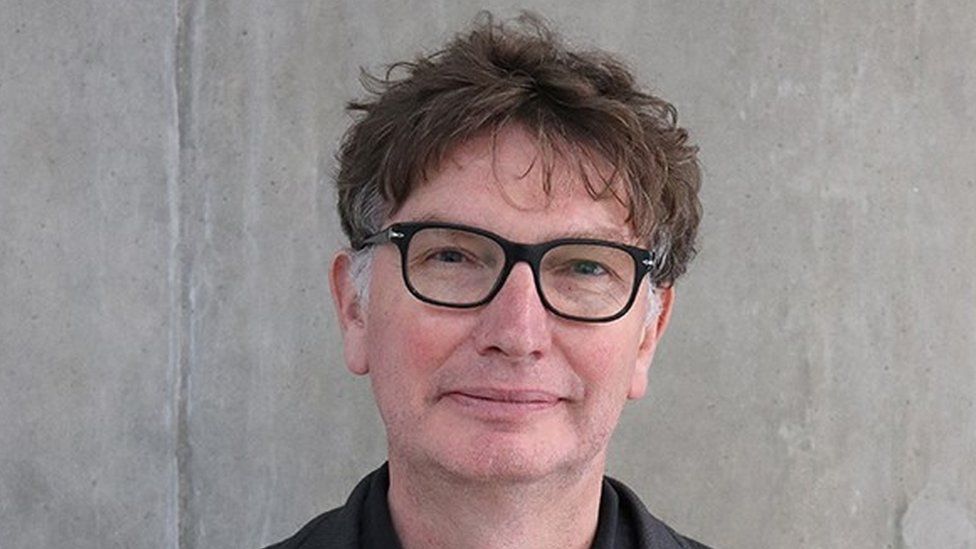Trainspotting producer to lead revived Edinburgh film festival
- Published

Andrew Macdonald will chair a new organisation designed to revive the festival
The producer behind hit Scottish films Trainspotting and Sunshine on Leith is to design and lead a new Edinburgh International Film Festival from 2024.
Andrew Macdonald, whose first film Shallow Grave premiered at the festival in 1994, will chair a new organisation designed to revive the event.
The 76-year-old festival collapsed into administration last year.
It will run this summer with a scaled-down programme as part of the Edinburgh International Festival.
Mr Macdonald was born and educated in Scotland and comes from a family of film-makers.
His brother Kevin Macdonald directed One Day In September, The Last King of Scotland, and The Eagle.
Their grandfather was Emeric Pressburger, who wrote and produced I Know Where I'm Going, A Matter of Life and Death, and Black Narcissus.
Mr Macdonald began producing films in his late 20s and has made more than 30 films, including 28 Days Later and Ex Machina.
The 57-year-old is probably best known for his collaborations with screenwriter John Hodge and director Danny Boyle, including Trainspotting and its sequel T2.
Andrew Macdonald (right) with director Danny Boyle and actor Johnny Lee Miller at the New York premiere of Trainspotting in 1996
Mr Macdonald said the Edinburgh film festival played a huge part in his early producing career and was admired around the world.
He said working on a proposition for the future of Edinburgh International Film Festival (EIFF) had been compelling.
"I'm looking forward to helping to build long-term success for EIFF in the years to come," he said.
The festival ceased trading in October 2022 alongside the Edinburgh Filmhouse and the Belmont cinema in Aberdeen.
The parent charity that ran them - The Centre for the Moving Image (CMI) - announced it had called in administrators after what it described as a "perfect storm" of sharply rising costs and reduced trade due to the effects of the Covid pandemic.
It announced 102 staff had lost their jobs as a result of the closures.
Creative Scotland acquired the intellectual property rights to the Edinburgh International Film Festival in December and its film wing, Screen Scotland, recruited Mr Macdonald.
Screen Scotland's Isabel Davis said the new chairman was an indication of its ambition for the festival's future.
"He was one of the first to offer support when the previous organisation collapsed and with his customary vigour, Andrew has already been instrumental in bringing people together to build an exciting new vision for what Edinburgh International Film Festival can become," she said.
Ms Davis said Mr Macdonald's entrepreneurial mindset and producer's can-do attitude made him ideal for the role.
Andrew Macdonald and his brother Kevin are the closest thing Scotland has to film-making royalty.
The grandsons of Emeric Pressburger, a pillar of the British industry, they have both played their parts in the creation of Scotland's fledgling industry - and the Edinburgh International Film Festival has been an important chapter in both their careers.
Shallow Grave, the first film Andrew Macdonald produced, received its world premiere at EIFF in 1994. Two years earlier, while working at the festival, he made a video diary about the challenges of pulling together funding for the film.
Funding is just one of the many challenges he will face as chair of the new festival.
Until he recruits a board and executive team, it is unclear what funds will be made available.
There are still questions to be answered about the demise of CMI, which led to the closure of the festival, as well as the Filmhouse in Edinburgh and the Belmont in Aberdeen.
This summer there will be a one-off, week-long edition of the festival under the auspices of the Edinburgh International Festival.
It is a brave attempt to keep the spirit of the festival alive but things have changed dramatically since it began in 1947.
EIFF is now one of hundreds of festivals competing for films, film-makers and audiences.
Even on its own doorstep, it has to fight for a share of the limelight.
Finding spaces to screen films will also be challenging - with the Filmhouse gone and the Edinburgh Festival Theatre heavily booked.
A closer relationship with the other festivals may help the EIFF in its recovery but local support will also be important.
Whether that is those who make films, or simply enjoy watching them, that support will be vital.
Related Topics
- Published8 March 2023
- Published6 October 2022